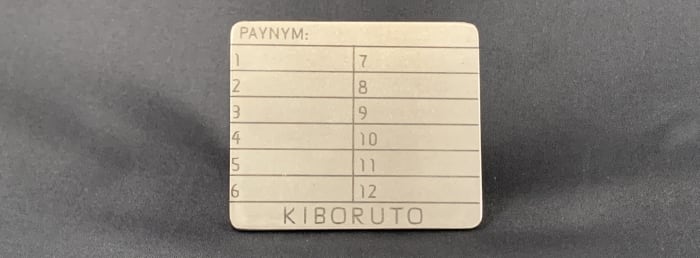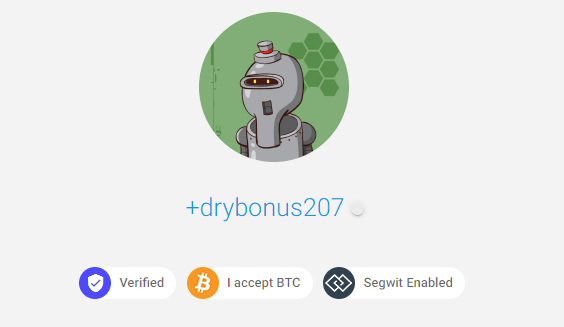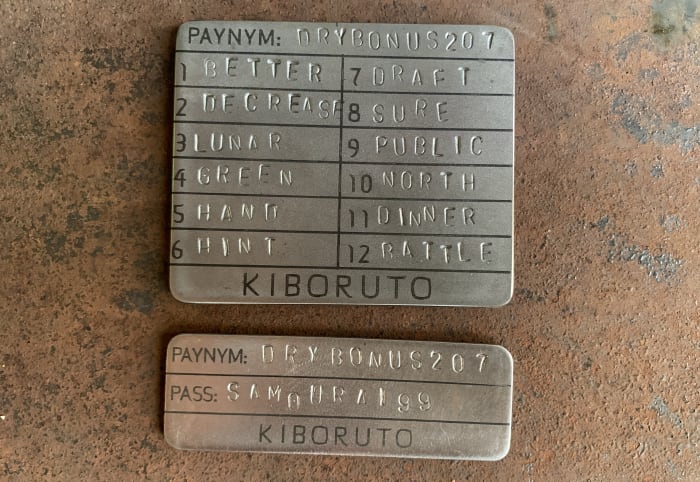[ad_1]
This guide demonstrates how to set up a fresh Samourai Wallet on Android and secure the seed phrase in a robust, stainless-steel backup called the Kiboruto, made by @Crazyk_031 and @stackbitme. You can find the Kiboruto and more at crazyk3d.com.
Introduction
If you have taken self custody of your bitcoin, congratulations on taking the first steps toward leading a permissionless life. Now, you should make sure your bitcoin is secure and safe from environmental hazards like fire and flood. Writing down your backup information in a notebook is a good start but at some point, you may find that this no longer feels secure enough when you take environmental hazards into account.
When you take the radical responsibility of self custody over your bitcoin, you and you alone are responsible for those funds. There is no charge-back feature or 1-800 helpline with Bitcoin, so you want to be sure that you take every precaution in protecting your funds. Since the Kiboruto is tailor made for Samourai Wallet, that wallet will be the focus of this guide. With Samourai Wallet, there are three key pieces of information you want to secure:
1. Seed Words
When you set up Samourai Wallet, you will be given a list of 12 words known as your “seed words,” sometimes also referred to as your “seed phrase” or “mnemonic phrase.” These 12 seed words are a key piece of information that allows you to restore your Bitcoin wallet in the event that you lose your phone, or it is stolen, or it is damaged beyond repair, for example. Seed words always need to be saved in the same order that your wallet presents them to you. If you get even one word in the wrong order, it could render your bitcoin backup useless. Be prepared for the worst and secure your seed words like they were gold or jewelry.
2. Passphrase
You will also set a passphrase when generating your Samourai Wallet. The passphrase is something unique that you set, it is not generated by Samourai Wallet. Your Samourai Wallet has no way of knowing what passphrase you set and also, any passphrase you enter will generate a valid wallet. Whether that is the wallet which contains your bitcoin or not depends on your ability to enter the same passphrase as the one you originally set when setting up your wallet for the first time. Unlike seed words, which come from a predefined list of 2,048 English words, a passphrase on the other hand can include any combination of lower/upper case letters, numbers and special characters that you want to use.
3. PayNym
Last but not least is your PayNym. The PayNym is a unique name and avatar that is associated with your wallet. You can use this PayNym to verify that you have in fact restored the correct wallet. Your PayNym is capable of a lot more though: It can display a static payment code to receive funds without revealing any of your prior transaction history to anyone. Use your PayNym to connect with other Samourai Wallet users so that you can build collaborative CoinJoin transactions like Stowaway or StonewallX2. Check out usecahoots.com to learn more.
The next section will walk you through exactly how to get these three pieces of information from a new Samourai Wallet.
Setting Up Samourai Wallet
The Kiboruto stainless-steel backup was designed specifically for your Samourai Wallet. Stainless-steel backups like this can withstand extreme environmental conditions such as a house fire or severe flooding. Oftentimes, people will use a pen and paper to write down their seed phrases — this is a good start and if you want to use a pen and paper, then download the Samourai Wallet recovery template here. But your paper backup may not withstand a house fire or flooding, so consider using both methods to have one as a fail safe. Keep in mind, though, that anyone who gains access to this information will technically be able to gain access to your bitcoin, so keep them secure.
Here is a video on how to set up your Samourai Wallet for the first time and get the seed words that you will later stamp into your Kiboruto. Please note that the wallet version (0.99.96g) used in this video has since been updated to a newer version with a detailed explainer introduction. The new version will be showcased later in the guide when demonstrating how to recover your seed words.
The next section will walk you through how to stamp your Samourai wallet backup information into your Kiboruto.
Stamping The Kiboruto
Once you have set up your wallet and identified your PayNym, you can navigate back through the menu to display your seed words and then stamp them into the Kiboruto, as shown in the video below.
- From your Samourai Wallet homepage, navigate to the three-dot menu in the upper right-hand corner and select “settings,” then “wallet,” then “show mnemonic.” A dialog box will appear with your 12 seed words. These are the words you want to stamp into the Kiboruto in order.
- To test your passphrase prior to stamping, from your Samourai Wallet homepage, navigate to the three-dot menu in the upper right-hand corner and select “settings,” then “troubleshoot,” then “passphrase/backup test.” From there, you can enter your passphrase and Samourai Wallet will confirm if it is correct. Once you know that you have it correct, then you can stamp it in the Kiboruto.
- To view your PayNym from your Samourai Wallet homepage, navigate to the blue “+” sign in the lower right-hand corner then select the purple PayNym icon. Your PayNym short name will be displayed directly below your PayNym robot avatar.
Make sure that you use a solid surface on which to stamp your Kiboruto, like a concrete floor. A heavy hammer, like a four-pound mini sledge, works well to get a crisp stamp. You will stamp the 12 seed words in order on the large Kiboruto plate and then stamp your passphrase and PayNym on the small Kiboruto plate. This way, you can store the two pieces of information separately if you want. You will need both pieces (seed words and passphrase) to recover your bitcoin in the event that you lose access to your wallet.
Now you should have your seed words, unique PayNym and your passphrase secured in metal on the Kiboruto. This way, you have the information needed to restore your Samourai Wallet and recover your bitcoin in case your phone is lost, damaged or stolen or your backup is exposed to fire or flooding.
The next section will demonstrate a fire test of the Kiboruto to verify that the backup information is recoverable in the event of extreme environmental conditions.
Kiboruto Fire Test
Any stainless-steel backup should be able to withstand fire or flooding. But testing these backups is important to verify that the information contained within is recoverable. You may not want to or may not have the tools/skills necessary to conduct your own fire test, so here is an example of the Kiboruto being brought up to just under melting point, 1,500 degrees celsius.
The Kiboruto successfully secured the vital information needed in order to restore the Samourai Wallet and regain access to the bitcoin. The seed phrase is 100% recoverable and even most of the etching survived.
The next section will demonstrate how to restore your Samourai Wallet using only your Kiboruto backup information.
Restoring From Kiboruto
The great thing about seed words is that they follow the popular BIP39 standard. This means that you can use a variety of Bitcoin wallets to recover your funds from this kind of backup. For example, if you lost your mobile phone and bought a new one, you could download the Samourai Wallet application again and then follow these recovery steps using your Kiboruto to regain access to your bitcoin.
Once you launch Samourai Wallet, you will have the recommended options to connect to Tor and connect to your own RoninDojo. Then you will have the option to restore from backup. Simply enter your seed words in order from your Kiboruto and then add your passphrase from your Kiboruto and then you should be presented with the same PayNym as your original and have access to your bitcoin once again.
Conclusion
That should be everything you need to restore your Samourai Wallet after a catastrophic event in which you lose your phone and need to restore access to your bitcoin. Should you ever have questions about the wallet derivation path, WalletsRecovery.org has compiled most Bitcoin wallets in a list.
Here are the Samourai Wallet derivation paths, for example:
- Deposit: m/44’|49’|84’|47’/0’/0′
- Bad Bank: m/84’/0’/2147483644′
- Pre Mix: m/84’/0’/2147483645′
- Post Mix: m/84’/0’/2147483646′
- Ricochet: m/44’|49’|84’/0’/2147483647′
When restoring a Samourai Wallet on another Samourai Wallet client, you will not need to worry about these derivation paths. This would only be cause for consideration if restoring across platforms to another wallet.
Some final considerations are how many copies of the Kiboruto you want, where to store them and whether you store the passphrase separately or not. Everyone’s threat model, situation and circumstances are unique, so each individual will need to make these decisions on their own. Just keep in mind that an adversary could restore your wallet if they found your seed words and passphrase.
Using a RoninDojo is the most private way to use Samourai Wallet. @BitcoinQ_A wrote a great guide on getting started with it and there are full instructions maintained on the Ronin wiki page. There is also a Bitcoin Magazine guide on setting up the new plug-and-play RoninDojo Tanto. If you ever have questions, reach out. Both developer teams maintain resourceful community support channels on Telegram:
This is a guest post by Econoalchemist. Opinions expressed are entirely their own and do not necessarily reflect those of BTC Inc or Bitcoin Magazine.
[ad_2]
Source link





Comments are closed.